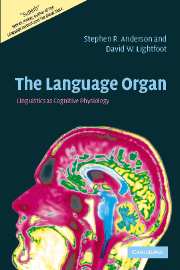Book contents
- Frontmatter
- Contents
- Preface
- 1 Studying the human language faculty
- 2 Language as a mental organ
- 3 Syntax
- 4 Sound patterns in language
- 5 Describing linguistic knowledge
- 6 Phonetics and the I-linguistics of speech
- 7 Morphology
- 8 Language change
- 9 “Growing” a language
- 10 The organic basis of language
- References
- Index
3 - Syntax
Published online by Cambridge University Press: 03 December 2009
- Frontmatter
- Contents
- Preface
- 1 Studying the human language faculty
- 2 Language as a mental organ
- 3 Syntax
- 4 Sound patterns in language
- 5 Describing linguistic knowledge
- 6 Phonetics and the I-linguistics of speech
- 7 Morphology
- 8 Language change
- 9 “Growing” a language
- 10 The organic basis of language
- References
- Index
Summary
The emergence of syntax within linguistics
Before the development of generative grammar in the late 1950s, linguists focused almost entirely on the smallest units of language: sounds, minimal meaningful elements (“morphemes” like ed, ful, con – see chapter 7 below for more on this notion), and words, where the model of the Saussurian sign has most plausibility. “Syntax” was largely a promissory note to the effect that such sign-based analysis would eventually encompass the larger units of phrases, sentences, etc. Meanwhile, what went by that name was largely a kind of applied morphology: some instructions for what to do with the various kinds of words (inflected and otherwise).
For example, drawing from our bookshelves more or less at random, we find that Morris Jones' (1913) comprehensive grammar of Welsh is divided into two sections, phonology and accidence (inflectional properties), and has nothing under the rubric of syntax. Arthur MacDonnell's (1916) grammar of Vedic Sanskrit has two chapters on sounds, four chapters on inflections, and a final chapter entitled “Syntax”. There he has some observations about word order and agreement phenomena, and then a discussion of the uses of cases, tenses, and moods. He notes that the subjunctive mood has a fundamental sense of “will” and lists the uses of the subjunctive mood in main clauses, relative clauses, and with “relative conjunctions.”
- Type
- Chapter
- Information
- The Language OrganLinguistics as Cognitive Physiology, pp. 41 - 66Publisher: Cambridge University PressPrint publication year: 2002



